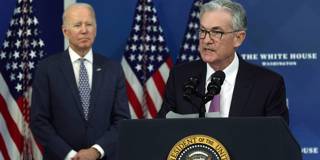Now that the US midterm election is over, markets and the financial press are returning to a more dovish outlook and concluding that major sources of inflationary pressure were transitory after all. But it may not last, because monetary policy appears to have been following politics more closely than its practitioners want to admit.
AUSTIN – Two days after the midterm elections in the United States, the Financial Times reported that US inflation has slowed, markets are “giddy,” and the Federal Reserve may now ease up on its interest-rate hikes. The timing was strategic, given that the push from oil prices ended in June, and that overall price changes have been low since July. With the election over, it seems, now it is safe to admit the facts.
Just this past August, the eminent Harvard economist Jason Furman wrote that “underlying inflation” in the US was “more likely to be rising than falling,” and that the Fed would “need to stick to its plan of rapid interest-rate hikes.” I replied that the “persistence of headlines doesn’t mean that price increases themselves are persistent,” and perhaps “the great inflation scare is already past.”
I wasn’t alone. About a year ago, the professional economists at the Fed appear to have made a similar prediction. The eminent Harvard economist Kenneth Rogoff attacked them in May 2022 for thinking that the price shock might be temporary; I countered that the Fed employs “sensible technicians” who “might well have expected price stability to return (at the new levels).”

AUSTIN – Two days after the midterm elections in the United States, the Financial Times reported that US inflation has slowed, markets are “giddy,” and the Federal Reserve may now ease up on its interest-rate hikes. The timing was strategic, given that the push from oil prices ended in June, and that overall price changes have been low since July. With the election over, it seems, now it is safe to admit the facts.
Just this past August, the eminent Harvard economist Jason Furman wrote that “underlying inflation” in the US was “more likely to be rising than falling,” and that the Fed would “need to stick to its plan of rapid interest-rate hikes.” I replied that the “persistence of headlines doesn’t mean that price increases themselves are persistent,” and perhaps “the great inflation scare is already past.”
I wasn’t alone. About a year ago, the professional economists at the Fed appear to have made a similar prediction. The eminent Harvard economist Kenneth Rogoff attacked them in May 2022 for thinking that the price shock might be temporary; I countered that the Fed employs “sensible technicians” who “might well have expected price stability to return (at the new levels).”